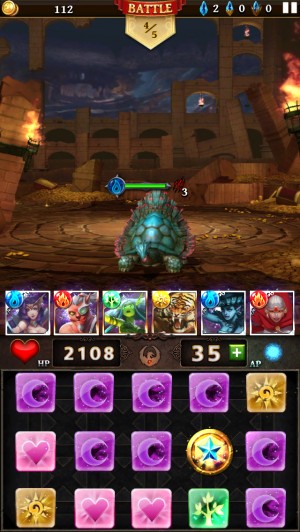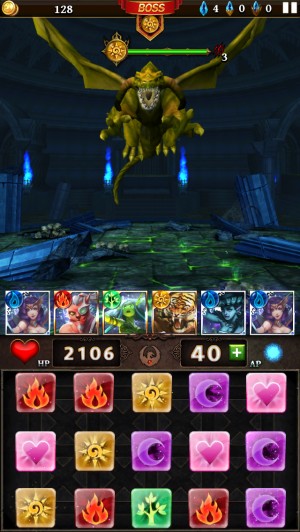 Puzzle And Dragons (Free) is a scorching hot hit in many Asian countries, but while it’s done quite well in Western countries, it hasn’t had quite the same dominance. So, while Eastern publishers are scrambling hand over fist to try to catch a little lightning in a bottle with their own takes on the idea, we actually haven’t seen all that many straight attempts from Western publishers. Enter Gameloft, one of the oldest and staunchest supporters of mobile gaming. It’s been known for many things in its history: making, shall we say, heavily inspired homages to popular titles, pushing extremely high-quality production values, and recently, making free-to-play games and pushing mandatory online connections. Their latest title, Dungeon Gems (Free), is all of those things wrapped up into one neat little package.
Puzzle And Dragons (Free) is a scorching hot hit in many Asian countries, but while it’s done quite well in Western countries, it hasn’t had quite the same dominance. So, while Eastern publishers are scrambling hand over fist to try to catch a little lightning in a bottle with their own takes on the idea, we actually haven’t seen all that many straight attempts from Western publishers. Enter Gameloft, one of the oldest and staunchest supporters of mobile gaming. It’s been known for many things in its history: making, shall we say, heavily inspired homages to popular titles, pushing extremely high-quality production values, and recently, making free-to-play games and pushing mandatory online connections. Their latest title, Dungeon Gems (Free), is all of those things wrapped up into one neat little package.
First, let’s get it out of the way at the beginning. In terms of gameplay, this is one of the closest imitations of Puzzle And Dragons (let’s call it PAD from here on out to save some electronic trees) I’ve seen from a major company. There are a couple of things it does differently, but it’s very clear where the inspiration came from. The main difference can be found in the exact mechanics of the puzzles, with the compelling and somewhat unique style of PAD changed out for a very familiar system of linking pieces by making a line. At the core, though, you’re going to be doing more or less the same things here that you did in that game. Enter dungeons that are composed of three or more battles, match colors to deal damage to the enemies, get more characters, cash, and gems as a reward, fuse them to level them up and evolve them, and repeat. Naturally, since it’s a social RPG, you’ll have to connect to the internet fairly frequently, so keep that in mind as well.
 The thing is, I really like these kinds of games. No, they’re not something I dedicate a lot of continuous time to, nor can you due to the stamina bars present in virtually every game of this type, but I find they make for a great way to fill in those little five minute gaps that every person has in their daily lives. I still play PAD and Brave Frontier (Free) pretty regularly, and hung around for a long time on countless others. I don’t mind that they are fairly similar, since most of them bring at least one interesting thing to the table. For Dungeon Gems, that interesting thing seems to be the production values, and little else.
The thing is, I really like these kinds of games. No, they’re not something I dedicate a lot of continuous time to, nor can you due to the stamina bars present in virtually every game of this type, but I find they make for a great way to fill in those little five minute gaps that every person has in their daily lives. I still play PAD and Brave Frontier (Free) pretty regularly, and hung around for a long time on countless others. I don’t mind that they are fairly similar, since most of them bring at least one interesting thing to the table. For Dungeon Gems, that interesting thing seems to be the production values, and little else.
This is a much prettier game technically than PAD, true to what you would expect from Gameloft. Monsters are animated 3D models, and the effect of zooming through the 3D backgrounds as you travel from fight to fight is pretty cool. I’m less thrilled with the art style and visual designs, but that’s going to be down to individual tastes. It’s all very polished, I’ll at least acknowledge. The menus and overall UI are also very well-done, but it seems to come at the price of speed, since even flicking through basic menus requires the game to load a little bit. I do like having a visual indicator of my progress through the various dungeons. It doesn’t look much fancier than a board game, but it’s much better than just seeing names checked off on a list.
 The actual combat has a few differences from PAD, and although I can see what they were going for, I think it’s less fun in practice. First of all, I wish they would have come up with something a bit more original than just drawing a line to match pieces. I know there’s only so much you can do with matching colored pieces on a grid, but I haven’t just seen this in a lot of other puzzle games, I’ve also seen it in a few other social RPGs, such as Spirit Stones (Free) and Fable Age (Free). I guess the one way this game is different is that you can simply tap one piece to use it, which seems like a good thing and sometimes is, but also means you can’t quickly cancel a match the way you would in other games. Instead, you have to remember to drag your line off of the play area entirely, which takes some getting used to. Like in Fable Age, you can link to other colors if you have enough left of a particular pool of energy earned by beating monsters, so you can basically link the whole board together if you save your points up.
The actual combat has a few differences from PAD, and although I can see what they were going for, I think it’s less fun in practice. First of all, I wish they would have come up with something a bit more original than just drawing a line to match pieces. I know there’s only so much you can do with matching colored pieces on a grid, but I haven’t just seen this in a lot of other puzzle games, I’ve also seen it in a few other social RPGs, such as Spirit Stones (Free) and Fable Age (Free). I guess the one way this game is different is that you can simply tap one piece to use it, which seems like a good thing and sometimes is, but also means you can’t quickly cancel a match the way you would in other games. Instead, you have to remember to drag your line off of the play area entirely, which takes some getting used to. Like in Fable Age, you can link to other colors if you have enough left of a particular pool of energy earned by beating monsters, so you can basically link the whole board together if you save your points up.
The other thing this game does differently comes in with these points, referred to as AP in this game. Most games of this type allow each member of your party to use a special attack, charged up over time. In Dungeon Gems, that special power also draws from your AP pool, so if you’ve used it all on linking pieces, you can’t use your powers, and vice-versa. I like that the game is trying to break away from the standard method here, but by having two important functions sharing the same finite pool of points, it makes me anxious about making use of either. In addition, of the three crowns you can earn on each stage, one of them is awarded for making minimal use of your AP. It’s an odd choice because restricting special powers makes for a less enjoyable game.
Other than those combat differences, the game doesn’t do anything unusual. You still have a stamina meter that is consumed with each fight, though it seems a little stingier here. There are still random character machines, two of which are tied to resources that are relatively easy to come by in-game, the other, with more powerful characters, tied to a premium currency that the game nevertheless gives out at a pretty decent pace. That premium currency can also be used to refill your stamina meter or increase the size of your inventory, and you’ll definitely be taking advantage of the latter, since your starting inventory in this game is painfully small. You can fuse characters to increase their levels, or fuse particular characters with a maxed out character to evolve them to a new form. Gold is required for both and it’s probably the most scarce resource in the game, even though it’s continually provided to you.
Dungeon Gems isn’t a bad take on the Puzzle And Dragons concept, but it’s kind of an unnecessary one from the player’s point of view. If you really like the style of puzzle it uses, there are more interesting social RPGs that use it. If you like the party building aspects, you’re probably better off sticking with PAD for its speed, slightly fairer economy, and more unusual and fun combat system. The only things Dungeon Gems offers that other games don’t is a slick level of presentation and a quicker battery drain, and I’m not sure if that’s actually enough. If you enjoy this style of social RPG, there’s certainly no harm in giving it a try and seeing if you take to it more than I did, but for me, the whole thing just feels incredibly redundant.